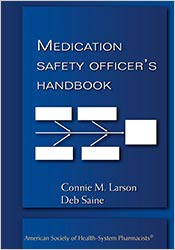100,000 Lives Campaign: an initiative of the Institute for Healthcare Improvement to engage U.S. hospitals in a commitment to implement changes in care proven to improve patient care and prevent avoidable deaths.
Agency for Healthcare Research and Quality: the lead Federal agency (formerly known as the Agency for Health Care Policy and Research) charged with improving the quality, safety, efficiency, and effectiveness of health care for all Americans by supporting health services research that will promote evidence-based decision making.
Alliance for Cardiac Care Excellence: a partnership of leading healthcare organizations whose mission is to ensure that every hospitalized cardiovascular patient in the United States receives the proper care at the right time by collaborating with hospitals and healthcare providers to bridge the gap between updated clinical science and patient care.
American Health Quality Association: a group of organizations and professionals whose mission is to improve the quality of healthcare and patient safety nationwide by sharing information about best practices with physicians, hospitals, and nursing homes and working with health care providers and quality improvement organizations to identify opportunities for and provide assistance in making improvements.
AQA Alliance: a collaboration of physicians, consumers, purchasers, health insurance plans, and others (formerly known as the Ambulatory Care Quality Alliance) whose mission is to improve health care quality and patient safety through a collaborative process in which key stakeholders agree on a strategy for measuring performance at the physician or group level; collecting and aggregating data in the least burdensome way; and reporting meaningful information to consumers, physicians, and other stakeholders to inform choices and improve outcomes.
Benchmarking: the process of assessing processes associated with quality care and making comparisons with other organizations to ensure that best practices are followed.
Care bundles: groups of evidence-based practices or interventions that improve patient outcomes.
Centers for Disease Control and Prevention: a component of the Department of Health and Human Services charged with managing public health efforts to prevent and control infectious and chronic diseases, injuries, workplace hazards, disabilities, and environmental health threats by conducting research and investigations and planning action to improve daily life and respond to health emergencies.
Centers for Medicare & Medicaid Services: a federal agency within the U.S. Department of Health and Human Services that evaluates the quality of care in hospitals, particularly the care received by the elderly, disabled, poor, or other patients covered by Medicare or Medicaid.
CMS/Premier Hospital Quality Incentive Demonstration Project: an initiative of the Centers for Medicare & Medicaid Services and Premier Inc, a healthcare alliance owned by more than 200 of the nation's leading not-for-profit hospitals and health care systems (roughly 1500 hospitals), to track hospital performance on a set of 34 nationally-standardized and widely-accepted quality indicators and pay annual incentives to top performers among participating hospitals.
Data mining: The identification of relationships and patterns from data using computer systems and algorithms to model or analyze data and predict trends.
Deficit Reduction Act: legislation passed by the United States Senate in late 2005 to reduce direct spending for various programs, including Medicare and Medicaid, by about $39 billion in the 2006-2010 period and by about $99 billion between 2006 and 2015.
Failure mode and effects analysis: a systematic way of identifying and preventing problems in processes and products before they occur; a proactive performance improvement tool to assist in new service design or enhancement of existing processes.
Hospital-Consumer Assessment of Healthcare Providers and Systems: the hospital version of a standardized survey instrument and data collection methodology developed by the Centers for Medicare & Medicaid Services and the Agency for Healthcare Research and Quality for measuring patients’ perspectives on health care.
Hospital Quality Alliance: A collaboration of national public and private organizations that have spearheaded a quality improvement initiative known as Improving Care Through Information to encourage hospitals to voluntarily collect and report to the public quality performance information. The collaboration involves the Centers for Medicare & Medicaid Services, American Hospital Association, Federation of American Hospitals, and Association of American Medical Colleges, with the support of the Joint Commission on the Accreditation of Healthcare Organizations, American Medical Association, American Nurses Association, National Association of Childrens’ Hospitals and Related Organizations, American Association of Retired People, American Federation of Labor and Council of Industrial Organizations, Consumer-Purchaser Disclosure Project, Agency for Healthcare Research and Quality, National Quality Forum, and U.S. Chamber of Commerce.
Indicator: a measure of health (i.e., the occurrence of a disease or other health-related event) or a factor associated with health (i.e., risk factor, receipt of health services) in a specific population; performance measure is a synonym for indicator.
Institute for Healthcare Improvement: a not-for-profit organization that promotes better health worldwide. Improving the lives of patients, the health of communities, and the joy of the health care workforce are among the goals of this organization.
Institute of Medicine: a component of the National Academy of Sciences established to work outside the framework of government to ensure scientifically-informed analysis and independent guidance on matters of biomedical science, medicine, and health.
The Joint Commission: an independent, not-for-profit organization that establishes standards and accredits hospitals and other healthcare facilities with the goal of improving the quality and safety of care provided by these institutions.
Leapfrog: The Leapfrog Group is a voluntary initiative by healthcare purchasers (e.g., employers) to improve the safety, quality, and affordability of healthcare for Americans. These goals are achieved through efforts to reduce preventable medical mistakes and reward healthcare providers.
Medicare Access and CHIP Reauthorization Act (MACRA) of 2015 repealed the Sustainable Growth Rate Formula and created the Quality Payment Program which aims to shift CMS Medicare Part B reimbursement from fee for service to value based purchasing.
Medicare Modernization Act: legislation enacted in December 2003 that introduced Medicare Part D, which provides coverage for outpatient prescription drugs, and contained various provisions with an impact on the delivery of healthcare to Medicare beneficiaries. For further information, go to the ASHP Medicare Modernization Act Resource Center.
Medicare Quality Improvement Community: an online national knowledge forum for healthcare and quality improvement professionals commonly referred to as MedQIC. It is sponsored by the Centers for Medicare & Medicaid Services.
National Association for Healthcare Quality: an organization of healthcare quality professionals whose mission is to promote the continuous improvement of quality in healthcare by providing educational and development opportunities for professionals at all management levels and within all healthcare settings.
National Committee for Quality Assurance: a not-for-profit organization whose mission is to improve the quality of managed care plans and health care through measurement, transparency, and accountability.
National hospital measures: quality indicators used to evaluate hospital performance with respect to certain medical conditions (e.g., acute myocardial infarction, heart failure, pneumonia). The indicators were developed by the Centers for Medicare and Medicaid Services and the Joint Commission on Accreditation of Healthcare Organizations.
National Patient Safety Goals: Specific requirements established annually by the Joint Commission on Accreditation of Healthcare Organizations to protect patient safety.
National Quality Forum: a public-private, not-for-profit organization created to develop and implement a national strategy for health care quality measurement and reporting. The mission of the National Quality Forum is to improve healthcare for Americans by endorsing consensus-based national standards for measurement and public reporting of healthcare performance data that provide meaningful information about whether care is safe, timely, beneficial, patient-centered, equitable and efficient.
Pay-for-performance: programs that provide incentive and rewards for high-quality care.
Performance measurement set: groups of indicators that reflect various related aspects quality in healthcare.
Pharmacy Quality Alliance: a collaborative initiative to improve healthcare quality and patient safety through the use of a strategy for measuring pharmacy and pharmacist performance, collection of data in an efficient manner, and reporting of meaningful information to consumers, pharmacists, employers, health insurance plans, and other healthcare decision-makers to facilitate informed decision making, improve outcomes, and prompt the development of new payment models.
Process flow mapping: the development of a graphical representation of a process, depicting decision points and end points.
Quality Improvement Organization: private contractors that work for the federal Centers for Medicare & Medicaid Services to monitor the appropriateness, effectiveness, and quality of care provided to beneficiaries. Visit Quality Improvement Organizations for additional information.
Quality Payment Program: implements MACRA authorized Merit-Based Incentive Payment System and Advanced Alternative Payment Models aimed at restructuring CMS reimbursement for Part B services.
Surgical Care Improvement Project: a hospital-based quality improvement initiative led by the Centers for Medicare & Medicaid Services to reduce the rate of adverse outcomes from common surgical procedures. The initiative is endorsed by the Centers for Disease Control and Prevention, American College of Surgeons, American Hospital Association, and many professional societies representing physicians, pharmacists, nurses, anesthesiologists, and other healthcare professionals.


